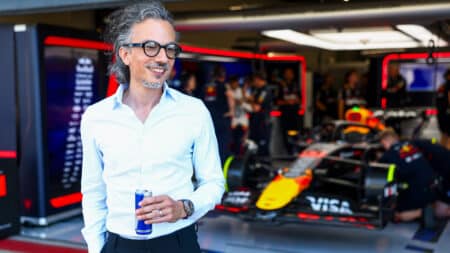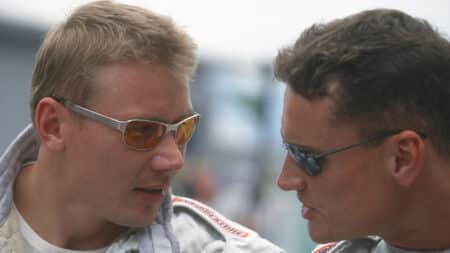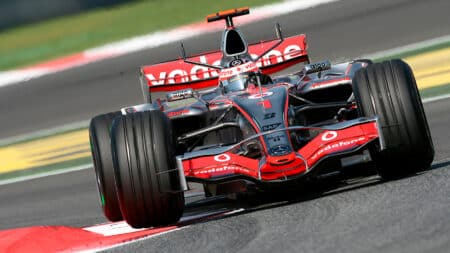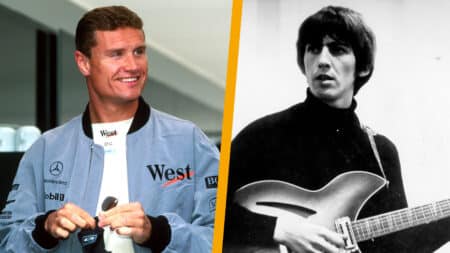
MPH: To the man trying to fill Christian Horner's shoes: good luck!
Laurent Mekies arrives as Red Bull F1 team principal with a series of immediate challenges to solve and long-term issues to tackle. He'll either sink or swim, says Mark Hughes
A series taken from the 162-page Motor Sport special 100 Greatest Grands Prix (other specials are available here).
Click here to buy the lead image.
From the editor Damien Smith
The Grand Prix motor races we can never forget…
Welcome to this special one-off magazine, dedicated to our love of Grand Prix racing and produced by the same team that brings you Motor Sport each month.
It seemed a good idea: whittle down 107 years of racing history to come up with 100 GPs that could be considered the ‘greatest’ – then rank them in meritocratic order. By week three, the old grey matter was beginning to ache…
Defining greatness was the first task. There were the obvious races – the wheel-to-wheel duels, the comeback classics. But there were also individual performances of supreme dominance, races that might not necessarily have been the most exciting to witness. Greatness goes way beyond thrill-a-minute, we decided.
Then there were those races of prominence, attached to a certain time or place that made them hugely significant. I’m thinking specifically of Belgrade, 1939. Only five entries took the start of a race that didn’t sound particularly scintillating. But as it happened to take place on the very day WWII broke out, we felt it worthy of inclusion. Meanwhile, Sebastian Vettel’s remarkable maiden GP win at Monza in 2008, for lowly Scuderia Toro Rosso, was left on the cutting room floor. Is that fair? You decide. We also opted to include a few races that weren’t Grands Prix, leastways in name, although the strength of entry was such that they might as well have been…
Choosing which races should make the list was hard enough; ranking the top 100 in some sort of order was even tougher, especially when it came to the crunch: which should be number one? We never did agree unanimously on the ‘greatest’, but if the magazine was to be finished a decision had to be taken. And that’s what I’m here for!
Will you agree with our choice and order? Probably not. But if steam begins to issue from your ears, take a deep breath. In any exercise such as this, there is no definitive list – because there can’t be. Our top 100 is based on opinion, nothing more, designed to be a bit of fun and to spark good-natured debate among fans of the world’s greatest sport.
So turn the page, delve in – and whatever you do, don’t take it too seriously.
2006 Brazilian GP
October 22, Interlagos
Felipe Massa, his Ferrari future secure, became the first Brazilian since Ayrton Senna in 1993 to win his home GP. He controlled the race from pole position, eking out a sufficient gap to retain the lead throughout his second planned pitstop.
It was, however, team-mate Michael Schumacher – iconic symbol of the team’s recent past – who stole the headlines.
Did Schumacher really want to retire? His announcement at Monza in September had been emotional but not entirely convincing. Ferrari, planning ahead, had placed him between a rock and a hard place: Kimi Räikkönen confirmed for 2007 at the expense of friendly Felipe – if Michael wanted to stay, that is. This was no way for Ferrari to treat the most successful driver in its history, and there was a distasteful hint of Enzo-like disdain in boss Luca di Montezemolo’s handling of the situation.
Schumacher won in Italy, and also in China, to draw level with Renault’s reigning world champion Fernando Alonso at the top of the points with two rounds remaining. But an engine failure while leading in Japan made the German the rank outsider at the finale: Alonso needed just a single point in Brazil.
The Bridgestone-shod Ferraris were the quickest at Interlagos, but a sudden drop in fuel pressure at the start of Q3 forced Schumacher to start from 10th. Worse, he dropped to last on lap eight when he clipped the front wing of Giancarlo Fisichella’s Renault and picked up a rear puncture. His subsequent charge to fourth, which included putting an aggressive Räikkönen firmly in his place – both men were attuned to the significance of the moment – served to emphasise that Schumacher had plenty more to give. If his second retirement came perhaps a year too late in 2012, his first had definitely come at least two, and possibly three, too early. PF

Laurent Mekies arrives as Red Bull F1 team principal with a series of immediate challenges to solve and long-term issues to tackle. He'll either sink or swim, says Mark Hughes

Former McLaren F1 team-mates Mika Häkkinen and David Coulthard are set to renew old rivalries in a new Evening with... tour – they told James Elson all about it

In Formula 1, driver contracts may look iron-clad on paper, but history shows that some of its biggest stars have made dramatic early exits

Former McLaren F1 ace told James Elson about his private audience with The Beatles' George Harrison, who played an unreleased grand prix-themed song